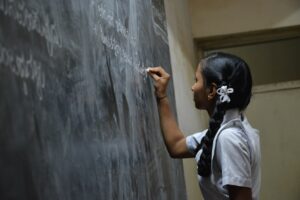Physical Address
23,24,25 & 26, 2nd Floor, Software Technology Park India, Opp: Garware Stadium,MIDC, Chikalthana, Aurangabad, Maharashtra – 431001 India
Physical Address
23,24,25 & 26, 2nd Floor, Software Technology Park India, Opp: Garware Stadium,MIDC, Chikalthana, Aurangabad, Maharashtra – 431001 India

A recently published report emphasizes the profound impact of extreme weather events, rising temperatures, and environmental changes on educational institutions and students. Authored by UNESCO, the MECCE project, and the University of Saskatchewan, the report titled “Education and Climate Change: Learning to Act for People and Planet” examines the crucial link between climate change and education. It reveals that annual climate-related school closures in low and middle-income countries significantly increase the risk of learning loss and dropout rates.
Impact of Climate Change on Education
Climate change considerably disrupts education systems, primarily through frequent school closures caused by extreme weather events like floods, hurricanes, and wildfires. These interruptions lead to substantial learning losses and increased dropout rates, especially in low and middle-income countries. The report highlights that climate-related school closures in these regions exacerbate existing educational inequalities.
Vulnerability of Marginalized Populations
Marginalized and vulnerable groups are disproportionately affected by climate-induced educational disruptions. The majority of countries at extremely high climate risk are low or middle-income nations, underscoring the need for targeted interventions to support these communities. These populations often lack the resources to adapt to and recover from extreme weather impacts, resulting in more severe educational setbacks.
Health and Infrastructure Challenges
Climate change poses direct threats to the health and safety of students and staff. Increased heat exposure, particularly during prenatal and early childhood stages, is associated with reduced schooling years and lower academic performance. Natural disasters that destroy educational infrastructure further intensify these challenges, leaving many students without safe and conducive learning environments. The report underscores that natural disasters like cyclones and floods have caused numerous deaths and significant damage to schools.
Educational Content and Curriculum
The UNESCO report highlights the need to integrate climate change education into school curricula. This integration should not only impart climate science knowledge but also develop skills for resilience, adaptation, and sustainable development. Action-oriented learning and community involvement are crucial for building students’ adaptive capacities to respond effectively to climate-related challenges.
Global Coordination and Policy Recommendations
UNESCO advocates for global and regional cooperation to address the educational impacts of climate change. This involves developing policy frameworks that promote inclusive and equitable quality education while considering environmental sustainability. The report calls for increased investment in education systems to enhance their resilience to climate-related disruptions. Coordinated efforts at the international, national, and local levels are essential for mitigating the adverse effects of climate change on education.
Reference : https://unesdoc.unesco.org/ark:/48223/pf0000389801